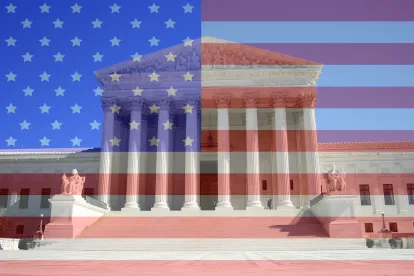Today, January 13, 2022 the U.S. Supreme Court issued two significant rulings regarding two of the federal COVID-19 vaccine mandates. First, the Supreme Court stayed the Federal Occupational Safety and Health Administration’s (OSHA) Emergency Temporary Standard (ETS) on COVID-19 for employers with 100 or more employees. This means the ETS is no longer in effect at this time, and employers are not under an obligation to comply with its requirements.
Second, the Court granted the federal government’s request that the preliminary injunctions blocking the Healthcare Centers for Medicare & Medicaid Services (CMS) Interim Final Rule (the “CMS Rule”) in certain states be lifted. This means CMS is allowed to move forward with its rule for healthcare workers nationwide, and that covered employers must comply with the CMS Rule.
The following is an update on the impact of the Supreme Court’s rulings for each rule.
OSHA ETS
As previously reported, the Supreme Court held an emergency hearing on January 7, 2022 regarding a judicial stay of OSHA’s ETS on COVID-19 for employers with 100 or more employees. Today, the Supreme Court ruled in favor of petitioners granting the judicial stay by a 6 –3 vote, with Justices Roberts, Thomas, Alito, Gorsuch, Kavanaugh, and Barrett voting in favor and Justices Breyer, Sotomayor, and Kagan dissenting.[1]
As a result, enforcement of OSHA’s ETS has been halted pending the disposition of the case in the United States Court of Appeals for the Sixth Circuit.
According to the Supreme Court’s ruling, the petitioners “are likely to prevail” on the merits of their case in front of the Sixth Circuit because COVID-19 impacts all areas of life and not just the workplace. The Supreme Court stated that “[p]ermitting OSHA to regulate the hazards of daily life – simply because most Americans have jobs and face those same risks while on the clock – would significantly expand OSHA’s regulatory authority without clear congressional authorization.”
While the Supreme Court acknowledged that OSHA has some authority to regulate occupation-specific risks related to COVID-19, it does not have such authority when OSHA takes an “indiscriminate approach” and “fails to account for” the crucial distinction between occupational risk and risk more generally.
The Supreme Court’s ruling today means that the ETS is stayed nationwide and that the vaccine and testing requirements for employers with 100 or more employees are blocked from taking effect. While this ruling is not the final decision of the case, such rulings are an indication of how the Supreme Court may ultimately decide should the case appear again in front of the Court. We will continue to monitor whether OSHA continues its efforts to defend the ETS after today’s ruling.
Healthcare Employers: CMS Interim Final Rule
As previously reported, the Supreme Court also held an emergency hearing on January 7, 2022 regarding the U.S. government’s request to issue a stay of the preliminary injunctions that are currently preventing the CMS Rule from taking effect in 25 states.
Today, the Supreme Court ruled in favor of the U.S. government, granting the judicial stay by a 5 – 4 vote, with Justices Roberts, Breyer, Sotomayor, Kagan, and Kavanaugh voting in favor and Justices Thomas, Alito, Gorsuch, and Barrett dissenting.[2]
According to the Supreme Court, the “challenges posed by a global pandemic do not allow a federal agency to exercise power that Congress has not conferred upon it.” However, “[a]t the same time, such unprecedented circumstances provide no grounds for limiting the exercise of authorities [an] agency has long been recognized to have.”
Here, the Supreme Court found that the CMS Rule fell within the authority that Congress had conferred on the Secretary of the Health and Human Services agency. Specifically, the Court stated that Congress has authorized the Secretary of Health and Human Services to “impose conditions on the receipt of Medicaid and Medicare funds” which are “necessary in the interest of the health and safety of individuals who are furnished services.” The Court noted that “COVID-19 is a highly contagious, dangerous, and – especially for Medicare and Medicaid patients – deadly disease.”
The Supreme Court’s ruling today means that the injunctions by the lower federal courts are lifted and the CMS Rule is in effect nationwide. We will have to wait and see if CMS issues any guidance for its compliance dates following the Court’s ruling.
Justin M. Wolber contributed to this article.
[1] National Federation of Independent Business, et al., v. Dep’t of Labor and OSHA, et al. and Ohio, et al. v. Dep’t of Labor and OSHA, et al.
[2] Joseph R. Biden, Jr., President of the United States, et al. v. Missouri, et al. and Xavier Becerra, Secretary of Health and Human Services, et al., v. Louisiana, et al.








 />i
/>i

